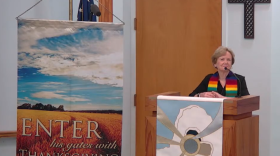ARI SHAPIRO, HOST:
It's been just over two weeks since a senior Hamas political leader was assassinated in Tehran. Iran blamed the killing on Israel and has vowed revenge. But so far, no retaliatory attacks. NPR's Jackie Northam looks at the calculations Iran may be making ahead of any such move.
JACKIE NORTHAM, BYLINE: The Hamas leader Ismail Haniyeh was in Tehran to attend the inauguration of Iran's new president, Masoud Pezeshkian. Haniyeh was killed during an explosion at a heavily guarded government guest house where he was staying. Sanam Vakil, an Iran specialist at the London-based think tank Chatham House, says his death on Iranian territory was seen as a massive security failure and a humiliation for the government.
SANAM VAKIL: And the Iranian system has presented the attack and the killing as a breach of Iran's sovereignty. And it's for that reason that they continue to suggest that they need to respond.
NORTHAM: Israel has been bracing for some sort of attack since the assassination, unclear if or how it will happen. Iran could direct its proxies, such as Hezbollah, to carry out a first strike, says Vakil.
VAKIL: I don't think, in this instance, relying solely on the proxies would achieve their goal of retaliating and asserting a deterrence against Israel. In order to do that, they have to respond directly.
NORTHAM: Four months ago, Iran had to make the same calculations after its diplomatic compound in Syria was attacked, killing seven people. Two weeks later, and after messaging what they were going to do, Iran launched more than 300 drones and missiles at Israel. Most were intercepted, and there was little damage. That may not be the case this time, says Gregory Brew, an Iran specialist at the Eurasia Group.
GREGORY BREW: And Iran is in something of a strategic dilemma. They likely feel that they need to go further than their attack in April. They need to go beyond the largely symbolic show of force that the April attack illustrated. But that, of course, would increase the risk of escalation both from Israel and from the United States.
NORTHAM: The U.S. is doing everything it can to try and prevent an attack that could spiral out of control, including swarming the area with aircraft carriers, fighter jets and a nuclear-powered submarine armed with cruise missiles. Dana Stroul, a former Pentagon official now with The Washington Institute for Near East Policy, says the U.S. has also launched a diplomatic push.
DANA STROUL: Tehran is getting flooded with messages from both Europe and from the Arab world to stand down and not launch this direct attack at this point in time because nobody wants to fight a big war. And this has clearly put them on their back foot.
NORTHAM: One off-ramp for Iran could be the cease-fire talks between Hamas and Israel that resume this week.
STROUL: So the Iranians put out a message about 48 hours ago that said they wouldn't attack if there was commitment and agreement on a cease-fire. This, I think, was their way of trying to find a way to stand down.
NORTHAM: But it's still far from certain whether there'll be a cease-fire agreement and no clear sign what Iran will do if the talks fail, unnerving the whole region, says the Atlantic Council's Brew.
BREW: The doctrine of strategic patience is one that is closely connected to Supreme Leader Khamenei. The practice of waiting, of putting everybody on edge, gives Iran something of a partial victory in and of itself.
NORTHAM: Brew says the biggest risk during the waiting is a miscalculation on any one side that could engulf the region in a full-scale war. Jackie Northam, NPR News. Transcript provided by NPR, Copyright NPR.
NPR transcripts are created on a rush deadline by an NPR contractor. This text may not be in its final form and may be updated or revised in the future. Accuracy and availability may vary. The authoritative record of NPR’s programming is the audio record.








